Many people have the misconception that if they live with their partner for a while in Ontario, they will be as good as a married couple. However, that is inaccurate because common-law partners don’t enjoy as much protection as a common-law relationship.
Because of this, it becomes more important than ever to create a cohabitation agreement in Ontario. This will ensure that you can expect certain benefits and enjoy a specific level of protection.
Our cohabitation agreement lawyer in Ontario has created a detailed guide to help you understand why such an agreement is necessary and how to create one without a lawyer.
What is a Cohabitation Agreement in Ontario?
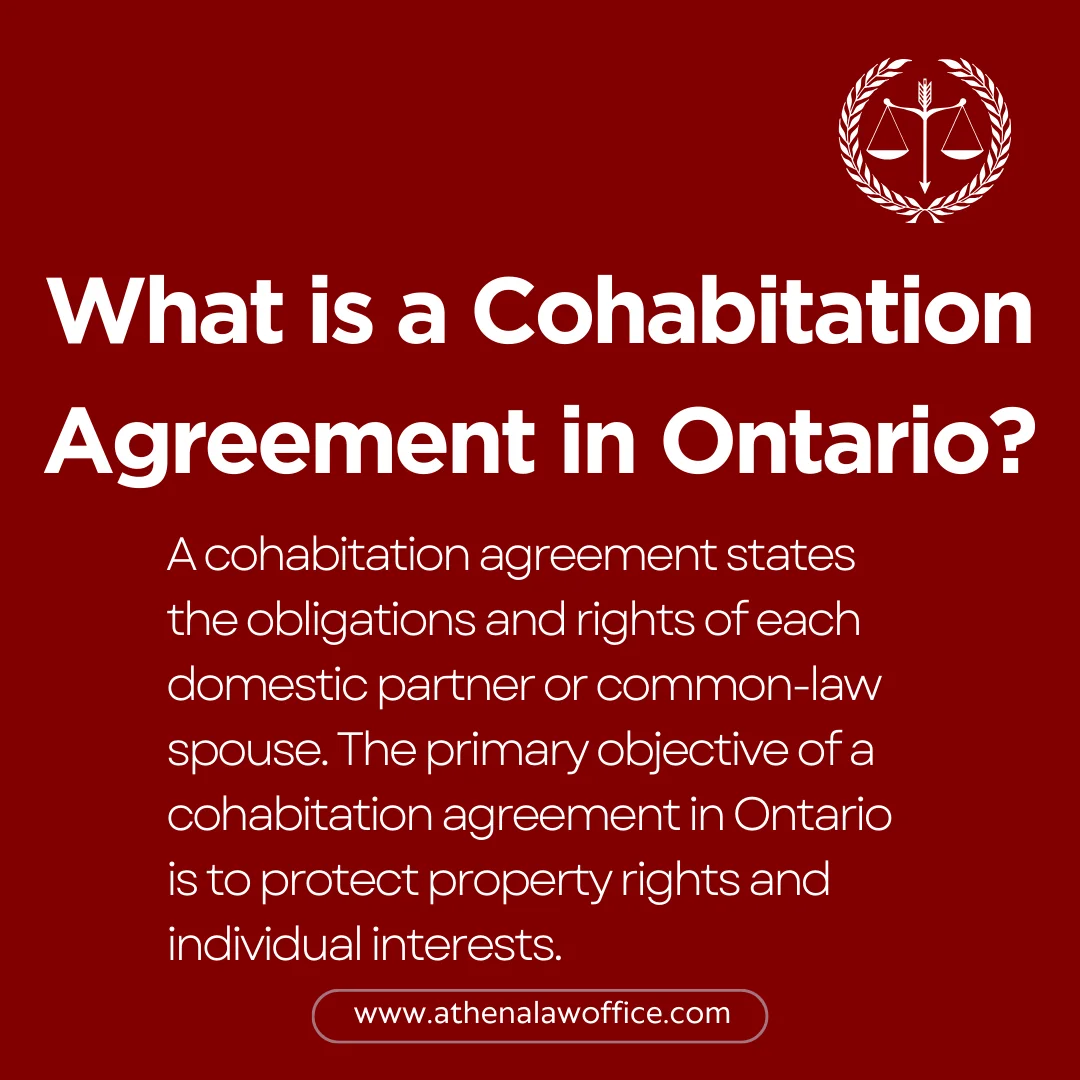
A cohabitation agreement states the obligations and rights of each domestic partner or common-law spouse as a result of their relationship.
The primary objective of a cohabitation agreement in Ontario is to protect property rights and individual interests within the common law relationship. This agreement will give each party their rights even when the relationship ends.
The agreement considers the common law in Ontario to ensure that partners can make decisions regarding important matters and discuss their assets, finances, debts, and more.
Why are Cohabitation Agreements Necessary?
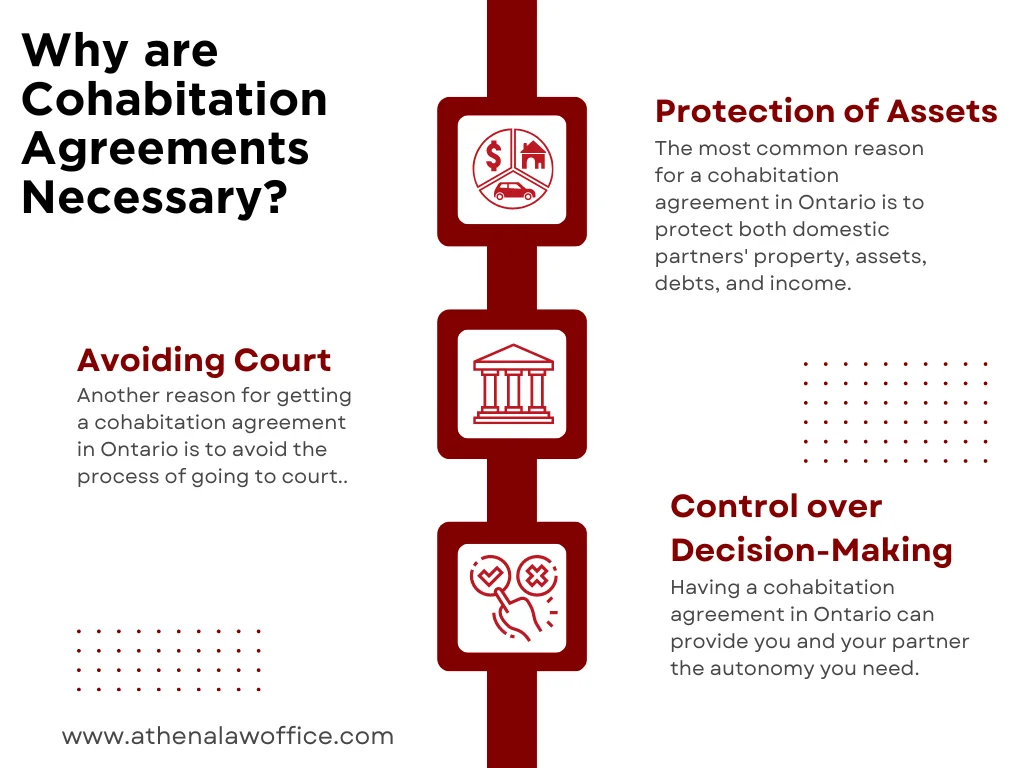
A cohabitation agreement in Ontario is necessary for a few reasons. Let’s review each of them below:
1. Protection of Assets and Property
The most common reason for a cohabitation agreement in Ontario is to protect both domestic partners’ property, assets, debts, and income.
This is a useful strategy in protecting both parties because it means that a creditor can’t have access to the property of both partners. Besides that, it prevents either party from making claims on the assets of another.
If you or your partner have substantial assets you are bringing into the property, then having this agreement will offer you the protection you require.
2. Avoiding the Complex Court-Supervised Process
Another reason for getting a cohabitation agreement in Ontario is to avoid the process of going to court. There are many complicated rules for dividing property and assets under common law in Ontario if you choose to separate.
If you want to avoid the court making decisions for you, then you can create the agreement beforehand with you and your partner. You and your common-law partner can agree on what you want to do and then set it out in a contract.
3. Have More Control over Decision-Making
When you leave everything up to the courts, you don’t have the power to make decisions when you and your partner split. However, having a cohabitation agreement in Ontario can provide you and your partner the autonomy you need.
You can create the agreement yourself or sit with a cohabitation agreement lawyer in Ontario to set down the terms of your agreement. This will help you create a document that will be legally sound and binding for both parties.
Common Law Ontario: What You Must Know
Under the common law in Ontario, common-law partners don’t enjoy the same level of protection as married couples. A common-law relationship is legally created under family law when:
- A couple has been living together in a relationship for three consecutive years
- A couple has been living together in a relationship (for any time), and they have a child or children together
Cohabitation is what determines whether the couple is in a common-law relationship. This will include whether the couple has a sexual relationship, whether one person is financially supporting the other, and whether they are sharing household expenses and duties.
Cohabitation Agreement vs. Prenups: What is the Difference?
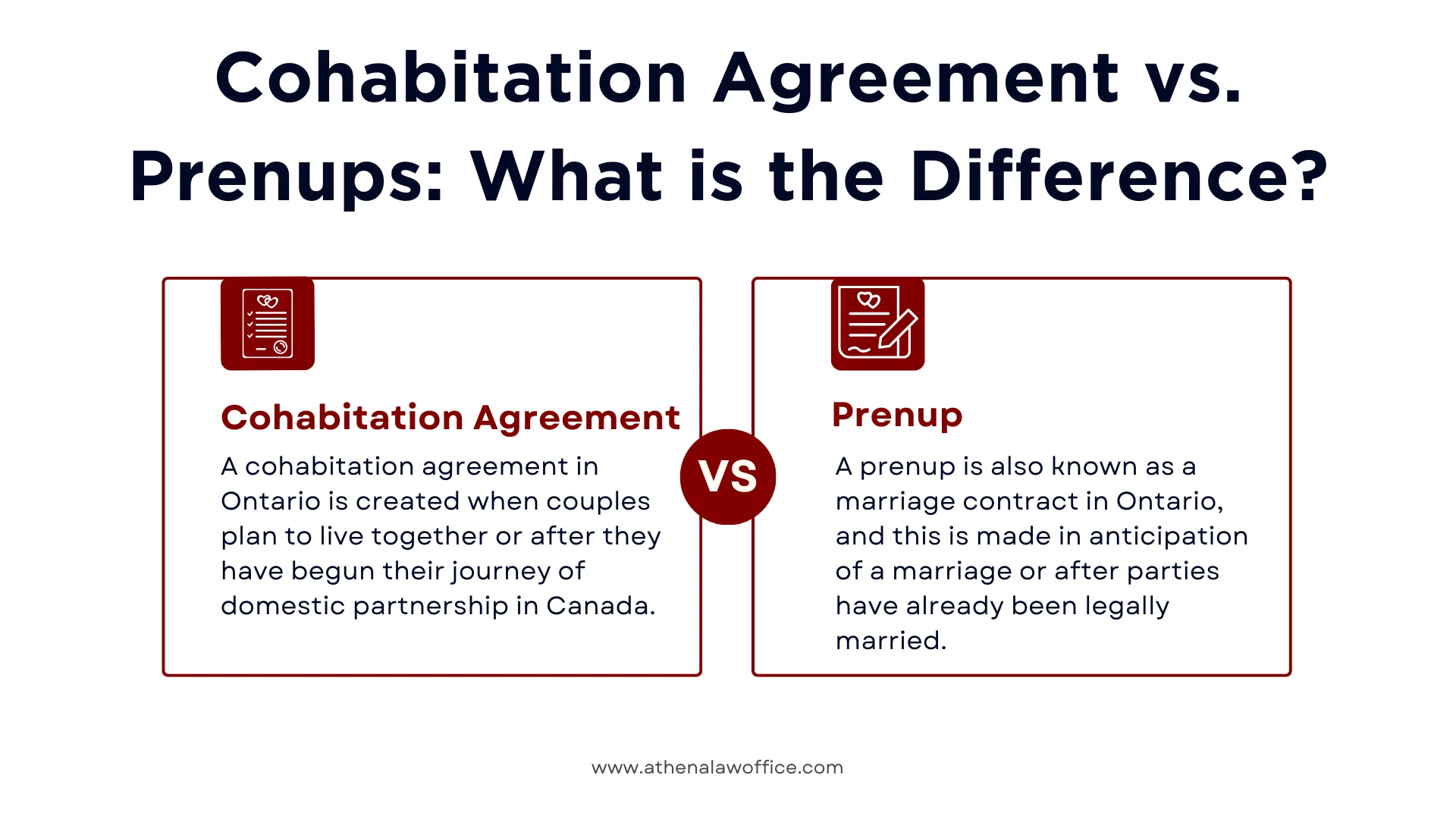
A prenup is also known as a marriage contract in Ontario, and this is made in anticipation of a marriage or after parties have already been legally married.
On the other hand, a cohabitation agreement in Ontario is created when couples plan to live together or after they have begun their journey of domestic partnership in Canada.
So, the type of relationship you have will determine the contract you can create. Both documents can specify the separate and shared property of the partners.
Cohabitation Agreement Checklist in Ontario: Top 5 Things to Include
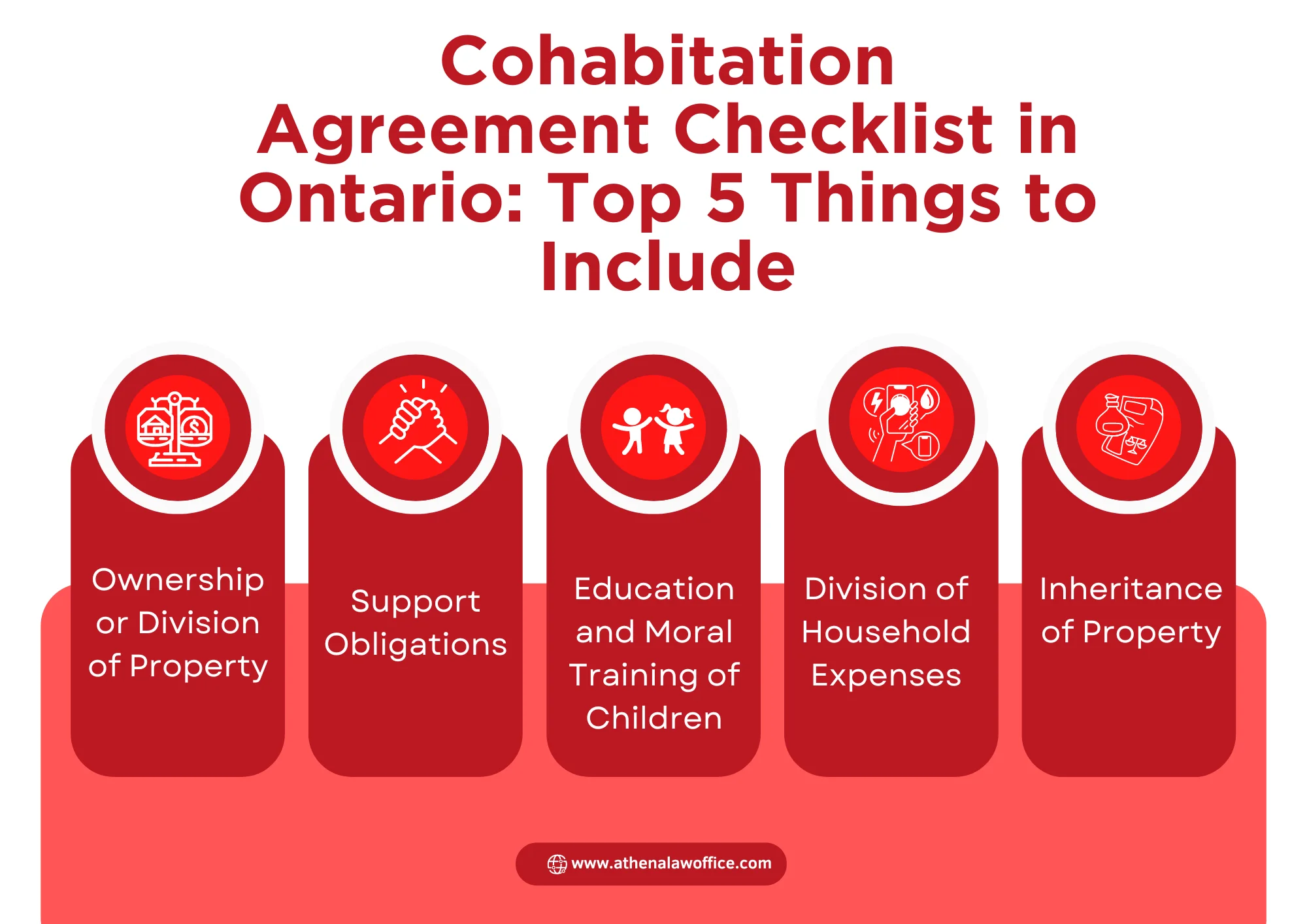
Now that you are familiar with the basics of a cohabitation agreement in Ontario, it is crucial to know what you must include. Let’s review all the top components you can include in the cohabitation agreement according to Ontario’s Family Law Act:
1. Ownership or Division of Property
You can include how you and your common-law partner in Ontario will own or divide property in the event of a separation. Doing this will give you more control over your assets, and you can set terms according to what you want.
If you don’t add these aspects to your agreement, then the court might decide it for you in the event of separation.
2. Support Obligations
Child support and spousal support obligations can also be set out in the cohabitation agreement in Ontario. Anyone who doesn’t include this can leave their children and their partners in a position of disadvantage once the partnership is terminated.
Keep in mind you can’t include child custody and access in your cohabitation agreement if you plan to have children. This is a matter for the courts, as they take the best interests of the child in mind when dealing with child custody matters.
3. Education and Moral Training of Children
You have the right to direct the education and moral training of your children under the Ontario Family Law Act. You can include this in your cohabitation agreement in Ontario.
It includes the way you will bring up your children, the religion they will practice, the education path they will take, and more. It ensures that you and your partner are on the same page about the important matters of your children.
4. Division of Household Expenses
You can also set out in the agreement how you will divide your household expenses. For example, you can pay some or all your expenses through a joint account.
On the other hand, you can also decide to split your expenses by percentage, expense types, income, and much more. You and your partner have the discretion to decide how you will go about this matter.
5. Inheritance of Property
Setting out the inheritance to settle your affairs is important to ensure you don’t leave your partner hanging. You can settle these affairs in your cohabitation agreement in Ontario if you don’t have wills or trusts.
Once you do, you can count on the fact that your wishes will be honoured as part of the agreement.
How Much Does a Cohabitation Agreement Cost in Ontario?

The cost of a cohabitation agreement in Ontario will depend on various factors, such as your budget, your lawyer’s experience, and the assets you are trying to protect. However, the cost can range anywhere between $2,000 and $3,000.
Expensive lawyers will charge you on the higher end of this range. However, you can easily find an affordable lawyer to create the agreement for you.
Are Cohabitation Agreements Legally Binding in Ontario?

As long as the cohabitation agreement meets the requirements for a valid domestic contract under Ontario Law, it will be legally binding. Like any other contract, certain elements must be present for the document to be legally binding.
These include the following:
- Offer and Acceptance: You create an offer, negotiate the terms, and sign the document, which will showcase an offer and acceptance.
- Consideration: Each party must exchange something of value in the agreement and benefit from it. This can include spousal rights and living arrangements under a cohabitation agreement.
- Mutuality: Both parties must have honest intentions when entering into the contract.
- Legality: None of the terms of the cohabitation agreement should break the law. Anything illegal or violating the law will deem the agreement to be unenforceable.
- Capacity: You and your partner should be legal adults with the mental capacity to enter into a contract.
Because of this, it is important to choose a cohabitation agreement lawyer to create a legally binding agreement. They will ensure all of these elements are present to guarantee a legally binding agreement.
When Can you Sign a Cohabitation Agreement in Ontario?
There is no rule as to when it is best to create a cohabitation agreement in Ontario. We recommend making it before your relationship or at the start to sort your matters beforehand.
However, you can also make this agreement anytime as your relationship keeps going. It is best not to resolve these issues later on, as signing the agreement can be challenging if you and your common-law partner don’t agree on certain matters.
Doing this will also help you establish trust between you and your partner. In the long run, this will mean higher chances of a successful relationship.
Creating a Cohabitation Agreement without a Lawyer
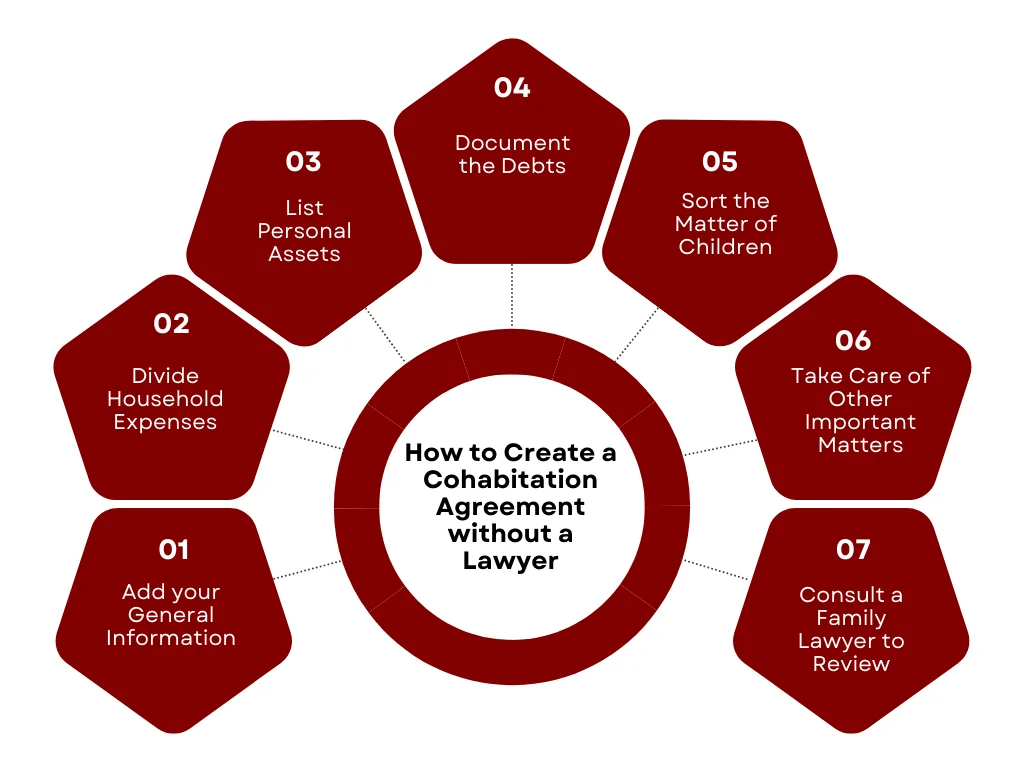
You can use a cohabitation agreement template if you don’t want to go through the process or costs of a lawyer. We do recommend opting for independent legal advice to ensure that the agreement is fair and just.
However, you can draft your cohabitation agreement in the following details:
1. General Information
The cohabitation agreement in Ontario must state you and your partner’s name, where you live, and when you started or will start cohabitating together.
Make sure you enter accurate details, as any misinformation will make the agreement between you and your partner void.
2. Dividing Household Expenses
You and your common-law partner can decide how you will be dividing the household expenses while living together. For example, will you pay some expenses from your joint account, or will you use another method to divide these expenses?
Many common-law partners split expenses by type, income, and percentage. You can choose any you like, depending on what you think is best for you and your partner.
3. Listing Personal Assets
Most people own some assets that they might want to keep separate from the relationship. You can also create a list of these assets in the Ontario cohabitation agreement.
Make sure to list which ones you want to keep separate. Doing this will ensure that your partner doesn’t have access to these assets if the relationship ends.
You can also list the assets you and your partner want to share in agreement. For example, a house, your cars, and more.
You can divide these assets between you and your spouse:
- Equally
- Based on the financial contributions of each partner
- By paying half the value to your partner so they can have complete ownership
Be honest and transparent with your partner to ensure a fair division of these assets.
4. Document the Debts
Assets are not the only thing people bring into the relationship. They also have personal and shared debts.
For example, if you have debts from before the relationship, then you can specify that you will be solely responsible for repaying the debt.
On the other hand, you can also specify that the responsibility for shared debts will be equal between both partners. You can discuss this together and decide how you will want to document and share the debts.
5. The Matter of Children
The matter of children is important in any long-term relationship, be it marriage or a common-law partnership. If you have children who still depend on you from a previous relationship, you have to state them in your cohabitation agreement in Ontario.
If you end up separating, then the parental rights and responsibilities will be governed by the laws of Ontario. So, be sure to clarify this matter in your cohabitation agreement.
6. Other Important Matters
Finally, there are some other legal rights and matters you must attend to in your cohabitation agreement in Ontario. If you have been living like a married couple for three years or more, you are also entitled to support, which you can set out in the agreement.
On the other hand, if one partner passes away without a will and testament, then the other partner may also have some inheritance rights.
7. Consult a Family Lawyer in Ontario
Last but not least, it is important to consult a family lawyer in Ontario if you are creating the cohabitation agreement on your own. They will review the document and let you know whether the agreement you have created is enforceable and fair.
You will also require two witnesses for each party’s signature. Those two people can witness both the signatures, and one of them can also be your lawyer.
They will notarize the document as well and ensure that everything is in order before the agreement is finalized and signed.
FAQs
How long do you have to live together to be common law in Ontario?
You have to be living together for three years or more to be common law in Ontario. The minimum requirement is at least three years.
What is the common-law cohabitation in Canada?
For the purpose of federal taxation, common law couples are ones who have been living together for 12 consecutive months and share a child through adoption or birth.
Can I kick out my common-law partner in Ontario?
If you are the owner of the home where you and your common-law partner are living, then you have the legal right to kick them out when the relationship goes south.
What is proof of cohabitation in Ontario?
You can submit one or more of these documents to serve as proof of cohabitation:
- Tenancy documents, such as rent increase, eviction, and more
- A copy of your utility or lease bills
Final Thoughts
You might be living together with your common-law partner in Ontario without adequate protection to ensure your rights. If you don’t want any issues down the road, then it is best to create a cohabitation agreement in Ontario.
If you require independent legal advice or a lawyer to create the agreement for you, then you can get in touch with our law offices. We will be more than happy to help you out and draft a fair and legally binding agreement.
Author Profile

- Barnett Law is a trusted and knowledgeable lawyer in Scarborough. Her expertise spans real estate law, family law, adoptions and fertility law. A lawyer by profession and a humanitarian by heart, Athena Narsingh Barnett wants to help people become more familiar with the legal system and be well-informed to make important legal decisions.
Latest entries
 legal guidanceJuly 4, 2025What Disqualifies You From Adopting A Child In Canada?
legal guidanceJuly 4, 2025What Disqualifies You From Adopting A Child In Canada? legal guidanceJune 30, 2025Is A Rooming House Legal In Ontario?
legal guidanceJune 30, 2025Is A Rooming House Legal In Ontario? legal guidanceJune 27, 2025Assisted Human Reproduction Act: Protecting Your Right To Build A Family
legal guidanceJune 27, 2025Assisted Human Reproduction Act: Protecting Your Right To Build A Family legal guidanceJune 23, 2025Fertility Law: Insights About Challenges And Legal Protection
legal guidanceJune 23, 2025Fertility Law: Insights About Challenges And Legal Protection


